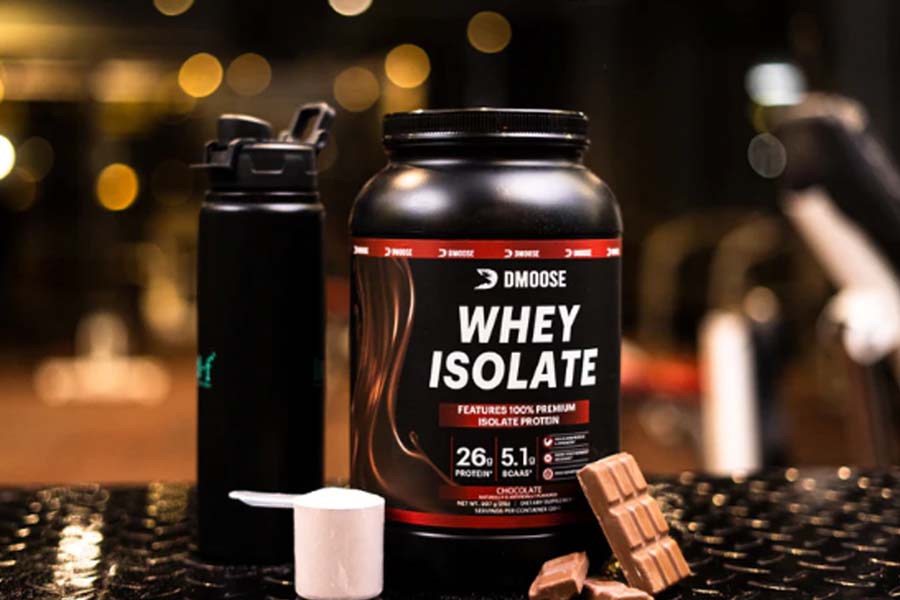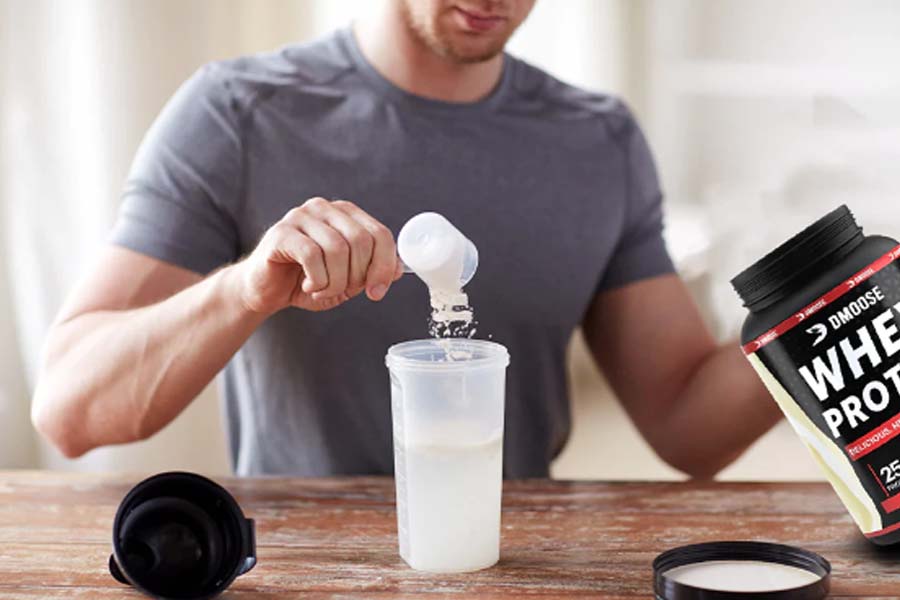Are you trying to build muscle or maintain a healthy diet? If so, you've probably considered adding protein powder to your routine. While protein powder is a great way to supplement your diet and reach your fitness goals, it's essential to understand the recommended dosage and potential risks.
In this article, we'll dive into the science behind protein powder, how much you should take daily, and what to consider when incorporating it into your diet. So, whether you're an experienced athlete or new to fitness, let's delve into protein powder together.
Importance of Protein in Your Diet

Protein is an indispensable nutrient for the human body, as it plays a critical role in tissue building and repair, hormone and enzyme production, and supporting a healthy immune system. It's also an essential nutrient for muscle growth and repair, particularly for those who engage in regular exercise or strength training.
While protein can be found in various foods, including meat, fish, eggs, beans, and nuts, many people turn to protein powders as a convenient way to supplement their diet and ensure they're getting enough protein.
According to a report, protein powder sales were valued at 4.7 billion U.S. dollars, making it the second-highest-selling product in the sports nutrition market after sports drinks. This popularity can be attributed to the various benefits of protein supplements, such as improved muscle mass, fat loss, performance, and recovery.
Related Article: Top 15 High Protein Snacks for Muscle Gain
Understanding Protein Powder Dosage

While protein powder can be a great addition to your routine, it's essential to understand the recommended dosage and potential risks. Let's look at how much protein you need and provide guidelines to help you make the most of this popular supplement.
Before diving into protein powder dosage, it's crucial to understand how much protein you need daily. The required protein intake depends on various factors such as your age, sex, weight, and activity level. According to the Recommended Dietary Allowance (RDA), a healthy individual should consume 0.8 grams of protein per kilogram of body weight daily. However, athletes or those who are highly active may need at least 1.4-1.6 g/kg/day protein to support their training and recovery.
When it comes to protein powder dosage, there are some general guidelines you can follow. It's important to note that these recommendations may vary depending on the specific product and your individual needs.
Determine Your Protein Needs

Before deciding on a protein powder dosage, determine how much protein you need daily. As mentioned earlier, the standard protein intake recommendation for adults is 0.8 grams per kilogram of body weight per day.
This means a 68-kilogram (150-pound) adult would need around 55 grams of protein daily MINIMUM. A standard scoop of protein powder typically contains 25-30 grams of protein, and it's generally recommended to consume 1-2 scoops of protein powder per day.
Consider Your Diet
It's important to consider how much protein you're already getting from your diet before adding protein powder. You may not need to supplement with protein powder if you already get enough protein from your diet. On the other hand, if you struggle to meet your daily protein needs, protein powder can be a convenient way to increase your intake.
Choose Your Protein Powder

There are numerous different types of protein powder available online. Each type of protein powder has a different amino acid profile and absorption rate, which can affect how much you should take and when. Be sure to pick a protein powder that suits your needs and preferences.
Follow the Manufacturer's Instructions
Protein powders typically come with instructions, including recommended serving sizes and frequency. Follow these instructions carefully to avoid taking too much or too little protein.
Consider Your Goals

Your protein powder dosage may also depend on your specific goals. For example, if you're looking to build muscle, you may need to take in more protein than someone who is simply trying to maintain their current weight.
Related Article: Whey Protein: Health Benefits, Side Effects, and Precautions
Benefits of Protein Powder
Protein powder is mainly used to gain muscle mass and strength but also provides many other benefits. Check out the other benefits of protein powder that might surprise you.
Improves Brain Function

Protein powder also helps improve brain function by supplying essential amino acids for cognitive development. A study found that consuming protein powder improved cognitive decline in older adults.
Aids in Weight Loss

Protein powder fills and keeps you full for extended periods, which helps reduce hunger and cravings. Consuming protein powder as part of a balanced diet helps you lose weight by reducing caloric intake. Additionally, protein powder helps increase metabolism, which can help you burn more calories throughout the day.
Supports Muscle Recovery

Protein powder can also aid in muscle recovery after a workout. Consuming protein after exercising helps reduce inflammation and soreness. Soreness is a common side effect of intense exercise, but consuming protein can help support muscle recovery and reduce discomfort.
Helps Promote Overall Health

Protein powder has a plethora of benefits that contribute to your overall health. Protein helps maintain healthy skin, muscles, and bones. Moreover, consuming protein powder aids in producing enzymes, hormones, and other essential molecules in the body.
Boosts Muscle Growth

Protein powder contains high-quality protein, which is crucial for muscle growth. When you lift weights, your muscles undergo small tears, and consuming protein helps repair and build these tears. That's why protein powder is an excellent source of protein for people who exercise regularly.
Lowers Blood Pressure

Whey protein, a popular protein powder supplement, has been known to lower blood pressure. A study showed that consuming whey protein for eight weeks lowered blood pressure significantly.
Reduces Inflammation

Protein powder has been known to reduce inflammation in the body. Inflammation is the body's natural response to protect itself against harm. However, chronic inflammation can cause several diseases, such as heart disease, cancer, and arthritis. Consuming protein powder helps reduce inflammation and guards against these diseases.
Related Article: 5 Things You Should Keep in Mind When Taking Whey Protein
Potential Risks of Consuming Protein Powder
As the old saying goes, "too much of a good thing can be bad," this applies to protein powder intake. While protein is essential for overall health, consuming too much protein powder can adversely affect the body. Here are some potential risks of overconsuming protein powder:
Gut Issues
One potential risk of consuming protein powder is that it can cause gut issues, such as constipation, stomach cramps, and bloating. Some protein powders contain additives, such as artificial sweeteners and thickeners, that can be difficult for the digestive system to break down.
Dehydration
Protein powder can also increase the risk of dehydration, mainly if used to replace meals or consumed before or after exercise. This is because protein powder is often high in sodium, which can increase thirst and cause water to be drawn out of the body.
Kidney Damage
Too much protein powder can strain the kidneys, which must work harder to filter excess protein. This can lead to kidney damage over time, particularly in those with pre-existing kidney problems.
Weight Gain
While protein is essential for building muscle, consuming too much protein powder can lead to weight gain. Excess protein is stored in the body as fat, mainly if consumed more than the body's needs.
Poor Nutrition
Using protein powder as a meal replacement can lead to poor nutrition, mainly if it is the only source of protein in the diet. This is because many protein powders lack the essential nutrients in whole foods, such as fiber, vitamins, and minerals.
Contamination
Protein powders, such as whey, are often made from animal-based sources and can be contaminated with antibiotics, hormones, and other toxins. This can affect health, particularly if the powder is consumed for a long time.
Related Article: How to Make Protein Bars: Chocolate Peanut Butter Protein Bars Recipe
FAQs
1. How many scoops of protein powder a day for weight loss?
The number of scoops of protein powder you should take daily for weight loss depends on your individual needs and goals. However, a standard recommendation is consuming 1-2 scoops of protein powder daily as part of a balanced diet and exercise program.
2. How many scoops of protein powder should I take after a workout?
The amount of protein powder you should take after a workout depends on your needs and goals. As a general guideline, consuming 1-2 scoops of protein powder within 30 minutes to an hour after your workout is recommended to aid in muscle recovery and growth.
3. How many scoops of protein powder should I take to gain muscle?
The number of scoops of protein powder you should take to gain muscle depends on your needs and goals. As a general guideline, it's recommended to consume 1-2 scoops of protein powder per day, combined with a balanced diet and exercise program, to support muscle growth and recovery.
4. How many scoops of protein powder should I put in a shake?
The number of scoops of protein powder you should put in a shake depends on your individual needs and goals and the serving size of the specific product. As a general guideline, using 1-2 scoops of protein powder per shake, combined with other nutritious ingredients, is recommended to make a balanced and tasty meal replacement or snack.
Conclusion
Protein powder offers a practical way of supplementing your diet to meet your protein requirements, which is crucial for repairing and building tissues, producing enzymes and hormones, and maintaining a healthy immune system. Consuming 1-2 scoops of protein powder daily is generally recommended, depending on your individual needs and goals.
While protein powder has several benefits, such as improved muscle mass, fat loss, and overall health, it's crucial to use it in moderation and be aware of potential risks, such as gut issues, dehydration, kidney damage, weight gain, poor nutrition, contamination, and allergic reactions. By understanding the science behind protein powder and its dosage, you can make informed decisions about incorporating it into your diet and achieving your fitness goals while minimizing potential risks.
Reading List
Article Sources
- Karlund, Anna, Carlos Gomez-Gallego, Anu M. Turpeinen, Outi-Maaria Palo-oja, Hani El-Nezami, and Marjukka Kolehmainen. "Protein Supplements and Their Relation with Nutrition, Microbiota Composition and Health: Is More Protein Always Better for Sportspeople?" Nutrients 11, no. 4 (April 12, 2019): 829.https://doi.org/10.3390/nu11040829.
- Yang, Jing, Hai‐Peng Wang, Xing Tong, Zeng‐Ning Li, Jia‐Ying Xu, Li Zhou, Bing‐Yuan Zhou, and Li‐Qiang Qin. "Effect of Whey Protein on Blood Pressure in Pre‐ and Mildly Hypertensive Adults: A Randomized Controlled Study." Food Science & Nutrition 7, no. 5 (April 21, 2019): 1857-64. https://doi.org/10.1002/fsn3.1040.
- Coelho-Junior, Helio Jose, Riccardo Calvani, Francesco Landi, Anna Picca, and Emanuele Marzetti. "Protein Intake and Cognitive Function in Older Adults: A Systematic and Meta-Analysis." Nutrition and Metabolic Insights 14 (June 4, 2021): 11786388211022372. https://doi.org/10.1177/11786388211022373.


















